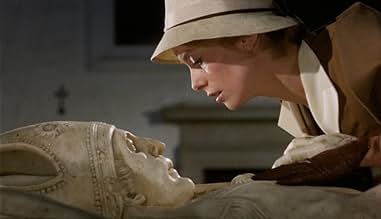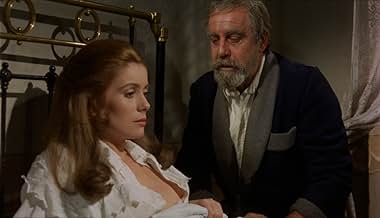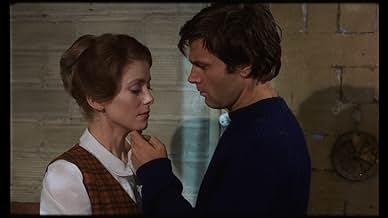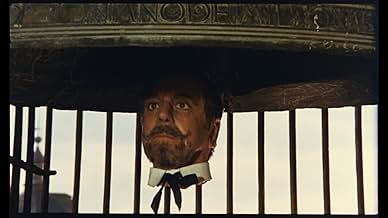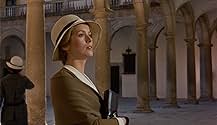IMDb रेटिंग
7.4/10
14 हज़ार
आपकी रेटिंग
अपनी मां की मृत्यु के तुरंत बाद, एक मासूम और युवा महिला को अपने मध्यम आयु वर्ग के कुलीन अभिभावक के घर में शरण मिलेगी.अपनी मां की मृत्यु के तुरंत बाद, एक मासूम और युवा महिला को अपने मध्यम आयु वर्ग के कुलीन अभिभावक के घर में शरण मिलेगी.अपनी मां की मृत्यु के तुरंत बाद, एक मासूम और युवा महिला को अपने मध्यम आयु वर्ग के कुलीन अभिभावक के घर में शरण मिलेगी.
- निर्देशक
- लेखक
- स्टार
- 1 ऑस्कर के लिए नामांकित
- 11 जीत और कुल 4 नामांकन
Mary Paz Pondal
- Muchacha
- (as María Paz Pondal)
Juanjo Menéndez
- Don Cándido
- (as Juan José Menéndez)
फ़ीचर्ड समीक्षाएं
I can't say I know Luis Bunuel's style well, since I've not seen many of his works, and those that I've seen usually just struck me as blah. But then yesterday I saw Tristana which starred Catherine Deneuve and was awe-struck by it. See, the comments that I've read online about it have seem to have the focus all wrong, they are more interested in commenting on Bunuel's usual attack on the bourgeois and catholicism. Yes it is dark and in some places rather surreal, but above all, Tristana is a simple and sad story about its characters as they grapple with life, love, loss and regret. It is especially well-crafted with its sinewed study of human relationships, and humans that desperately try to relate with each other.
Tristana, played brilliantly by Catherine Denueve, is the central character whom we see evolve from an innocent young girl with her many ideals about love and relationship, to a bitter and cynical woman at the film's end who cannot believe in anything any longer. It is with special finesse that Deneuve plays her, that we witness, with heartbreak, every turn of her back on the things she love, and every rejection of all morality that she held before.
Fernando Rey's character is probably the murkiest but ultimately most empathetic character, as at the end of the film, age wears off his hard-edged cynicism and turns him into the loving father figure that Tristana desperately needed in the beginning of the film. In a sense, it is a film about age, how when we reach a certain point in our lives we see things much clearer and as it is, rather than try to twist things to our advantage. The way Rey's character treasures the time with the vile and vindictive Tristana at the end of the film is not only overwhelmingly sad, but also an epiphany by an auteur who is gaining age himself.
In spite of all its dramatic turns of events, Tristana is not an emotional and angsty film in its portrayal of its characters' lives. Instead it is a soft and peaceful film that sympathetically accepts its characters' flaws as much as it forgives them. It is a film that evokes the intricate feeling of looking back in our dark and troubled past and finding the exquisite moments of happiness amidst all the cynicism and grit. When, towards the end, Rey reaches the peace that he has been struggling so hard to attain throughout the film, he notes, 'It's snowing so hard outside, but in this house, I'm nice and warm. What's there not to be happy about?'. A silent recognition that peace is not bending reality to your own will, but merely, acceptance.
Tristana, played brilliantly by Catherine Denueve, is the central character whom we see evolve from an innocent young girl with her many ideals about love and relationship, to a bitter and cynical woman at the film's end who cannot believe in anything any longer. It is with special finesse that Deneuve plays her, that we witness, with heartbreak, every turn of her back on the things she love, and every rejection of all morality that she held before.
Fernando Rey's character is probably the murkiest but ultimately most empathetic character, as at the end of the film, age wears off his hard-edged cynicism and turns him into the loving father figure that Tristana desperately needed in the beginning of the film. In a sense, it is a film about age, how when we reach a certain point in our lives we see things much clearer and as it is, rather than try to twist things to our advantage. The way Rey's character treasures the time with the vile and vindictive Tristana at the end of the film is not only overwhelmingly sad, but also an epiphany by an auteur who is gaining age himself.
In spite of all its dramatic turns of events, Tristana is not an emotional and angsty film in its portrayal of its characters' lives. Instead it is a soft and peaceful film that sympathetically accepts its characters' flaws as much as it forgives them. It is a film that evokes the intricate feeling of looking back in our dark and troubled past and finding the exquisite moments of happiness amidst all the cynicism and grit. When, towards the end, Rey reaches the peace that he has been struggling so hard to attain throughout the film, he notes, 'It's snowing so hard outside, but in this house, I'm nice and warm. What's there not to be happy about?'. A silent recognition that peace is not bending reality to your own will, but merely, acceptance.
Luis Buñuel had a mastery of screen technique attained by very few directors. Confronted by the script of Tristana, what contemporary director would know where to start?
Buñuel's attention to detail is extraordinary. Every scene is packed with visual interest. In some strange way, the decor forms an essential part of the structure; it is a facet of Buñuel's unique vision. Moreover, he not only knows exactly when to end a sequence, but how to end it. For instance, when Don Lope (Rey) puts down the dog and walks away, the camera follows not him but the dog: an endearing and brilliant touch, and there are many more. Compelling throughout, even spellbinding.
If this film were a framed picture hanging in a gallery, thousands would come to see it and Buñuel would be acclaimed as a great artist. He was a great artist, in fact, but the cinema is an ephemeral form and people forget. We need to buy the videos and watch these fine movies from time to time, just to remind ourselves that a film can be a significant art form and not merely a commercial product cynically synthesised to extract the largest amount of money from the greatest number of people.
Buñuel's attention to detail is extraordinary. Every scene is packed with visual interest. In some strange way, the decor forms an essential part of the structure; it is a facet of Buñuel's unique vision. Moreover, he not only knows exactly when to end a sequence, but how to end it. For instance, when Don Lope (Rey) puts down the dog and walks away, the camera follows not him but the dog: an endearing and brilliant touch, and there are many more. Compelling throughout, even spellbinding.
If this film were a framed picture hanging in a gallery, thousands would come to see it and Buñuel would be acclaimed as a great artist. He was a great artist, in fact, but the cinema is an ephemeral form and people forget. We need to buy the videos and watch these fine movies from time to time, just to remind ourselves that a film can be a significant art form and not merely a commercial product cynically synthesised to extract the largest amount of money from the greatest number of people.
I like all films by Buñuel, and I don't think any of his films are boring. Yet, even if they could be very remarkable, some films are much "cheaper", less perfect than others, maybe because they were on a more limited budget. Tristana, though, is one of the perfect ones, in terms well-made:ness. I haven't got much to complain about this film. There is only one piece of music, and obviously Buñuel didn't put much music in his films, but it's acceptable, perhaps a good thing. The acting is very good. Rey is very good. I find the most impressive things to be the script and the dialog, which are fantastic.
Not the most surrealistic work, yet, probably one of Buñuel's ten most well-made.
Not the most surrealistic work, yet, probably one of Buñuel's ten most well-made.
In the 30's, in Spain, the teenager Tristana (Catherine Deneuve) becomes an orphan when her mother, who is the servant of Don Lope (Fernando Rey), dies. Don Lope is a decadent but respected aristocrat, anticlerical and liberal with socialist principles, and he becomes the guardian of Tristana. Don Lope sexually abuses of Tristana and develops a strange lover/father relationship with her.
When Tristana meets the painter Horacio (Franco Nero), they fall in love with each other and Tristana flees from Don Lope. However, years later, Horacio brings Tristana back to Don Lope with a terminal disease on her leg. She has a severed leg and survives, and Don Lope asks her hand in marriage. She accepts but now Tristana is a bitter and cynical woman and Don Lope feels the consequence of his acts in the past.
"Tristana" is a morbid tale of lost of innocence by Luis Buñuel. I had seen this film for the last time on 05 Feb 2003 and despite the wonderful performances of Catherine Deneuve and Fernando Rey, it is not among my favorite Buñuel's films. As usual, the director criticizes the Church and the bourgeois class but his famous surrealism is only presented in Tristana's nightmare. My vote is seven.
Title (Brazil): "Tristana"
When Tristana meets the painter Horacio (Franco Nero), they fall in love with each other and Tristana flees from Don Lope. However, years later, Horacio brings Tristana back to Don Lope with a terminal disease on her leg. She has a severed leg and survives, and Don Lope asks her hand in marriage. She accepts but now Tristana is a bitter and cynical woman and Don Lope feels the consequence of his acts in the past.
"Tristana" is a morbid tale of lost of innocence by Luis Buñuel. I had seen this film for the last time on 05 Feb 2003 and despite the wonderful performances of Catherine Deneuve and Fernando Rey, it is not among my favorite Buñuel's films. As usual, the director criticizes the Church and the bourgeois class but his famous surrealism is only presented in Tristana's nightmare. My vote is seven.
Title (Brazil): "Tristana"
One of the latest works from the genius of Calanda, he was still stigmatized by Franco's dictatorship and he adapted a text by Benito Pérez Galdós about a young pretty girl (Catherine Deneuve) whose mother dies and has to go to live (and something else) with his stepfather (Fernando Rey).
"Tristana" contains many of the common factors of Buñuel's movies: his total contempt for the ruling sectors of society and the rich people, for hypocrisy and Puritanism; his irreverence, and a wicked and implicit sexual content. Only the man who made "Belle de Jour" would dare to amputate a leg to the goddess Deneuve (one of the most beautiful creatures that ever walked the earth). Fernando Rey plays a typical Spanish "hidalgo" that's come down in the world and that sexually harass his stepdaughter.
So, Buñuel not only hadn't lost his touch with the years, on the contrary, he felt more and more free as the time went by to let his genius flow *My rate: 8/10
"Tristana" contains many of the common factors of Buñuel's movies: his total contempt for the ruling sectors of society and the rich people, for hypocrisy and Puritanism; his irreverence, and a wicked and implicit sexual content. Only the man who made "Belle de Jour" would dare to amputate a leg to the goddess Deneuve (one of the most beautiful creatures that ever walked the earth). Fernando Rey plays a typical Spanish "hidalgo" that's come down in the world and that sexually harass his stepdaughter.
So, Buñuel not only hadn't lost his touch with the years, on the contrary, he felt more and more free as the time went by to let his genius flow *My rate: 8/10
क्या आपको पता है
- ट्रिवियाLuis Buñuel said that many of Tristana's idiosyncrasies, including her habit of asking people to choose between nearly identical objects, was based on the director's sister's similar habits.
- भाव
Don Lope: Poor workers. Cheated and then beaten. Work is a curse, Saturno. Down with work that you have to do to survive. That work isn't honorable, as some say. All it does is fatten the exploiting swine. However, what you do for pleasure ennobles man. If only we could all work like that. Look at me, I'd rather be hanged than work! So, I live poorly, but I live without working.
- इसके अलावा अन्य वर्जनOriginally released in Europe at 105 minutes.
- साउंडट्रैकÉtude No 12 in C minor, Op 10 'Revolutionary'
Written by Frédéric Chopin
टॉप पसंद
रेटिंग देने के लिए साइन-इन करें और वैयक्तिकृत सुझावों के लिए वॉचलिस्ट करें
- How long is Tristana?Alexa द्वारा संचालित
विवरण
- रिलीज़ की तारीख़
- कंट्री ऑफ़ ओरिजिन
- आधिकारिक साइट
- भाषा
- इस रूप में भी जाना जाता है
- Mảnh Đời Của Tristana
- फ़िल्माने की जगहें
- Paseo Recaredo, Toledo, Castilla-La Mancha, स्पेन(opening and closing scenes with Saturna, Viridiana and the mute boy)
- उत्पादन कंपनियां
- IMDbPro पर और कंपनी क्रेडिट देखें
बॉक्स ऑफ़िस
- US और कनाडा में सकल
- $14,586
- US और कनाडा में पहले सप्ताह में कुल कमाई
- $4,754
- 14 अक्टू॰ 2012
- दुनिया भर में सकल
- $14,586
- चलने की अवधि1 घंटा 39 मिनट
- ध्वनि मिश्रण
- पक्ष अनुपात
- 1.66 : 1
इस पेज में योगदान दें
किसी बदलाव का सुझाव दें या अनुपलब्ध कॉन्टेंट जोड़ें


